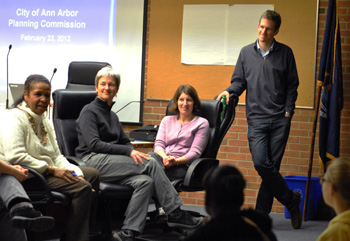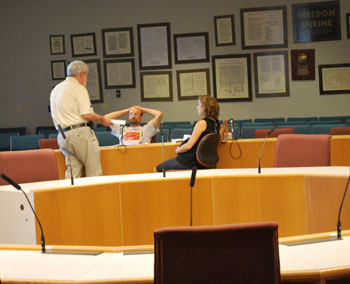The Ann Arbor Downtown Development Authority has enjoyed significant attention from the city council through the spring – and that attention will continue at least through next week.

Ann Arbor police department mug shots. Please note: When it comes to counting police officers or DDA board members, six of one is not half a dozen of the other. (“Art” by The Chronicle)
Stephen Kunselman (Ward 3) has been leading the effort by the council to have an impact on the DDA – first by proposing ordinance amendments, then by bringing forward a proposal during the council’s FY 2014 budget deliberations on May 20 – to reallocate DDA funds toward housing. More on that later.
Next week’s June 3 city council meeting would have marked the start of a three-month DDA-free period on the council’s agenda. However, Ward 2 councilmembers Jane Lumm and Sally Petersen, joined by Sumi Kailasapathy from Ward 1, have now placed a resolution on that meeting’s agenda calling on the DDA to allocate money for three additional police officers dedicated to patrolling the downtown area.
For Lumm, this might appear to be a course reversal. Earlier this spring she argued that funding for police officers should be found within the regular city budgeting process. She argued that police officers should be paid for with city general fund dollars – because the city is responsible for public safety. Specifically, she argued that the city should not be looking to the DDA to pay for police.
Yet it’s not actually a course reversal for Lumm. If you follow the city council and the DDA closely, her position now – calling on the DDA to fund police – makes perfectly logical sense, if “logical sense” means “political sense.”
The fact that this reversal makes perfect political sense is not an indictment of Lumm specifically, but rather of the entire 11-member council. They’ve managed as a group to forget what they accomplished together at their retreat in December 2012.
At that retreat, the council achieved a consensus that the city’s achievement of success for the public safety area would not be measured by the number of sworn officers. Instead they agreed that success would be based by actual crime stats, perceptions of safety by residents, and an objective measurement of the time that officers can spend on proactive policing. Yet the council’s debate on May 20 reverted to the familiar past habit of measuring safety success by counting sworn officers.
To the credit of the June 3 resolution’s sponsors, their proposal at least claims that adding police officers downtown would contribute to the perception of increased safety – a nod to the council’s retreat consensus. But I can imagine arguments both ways about whether that claim is true.
The council’s general distraction from its budget retreat consensus might be linked to the energy spent on the DDA. So what has stoked that interest? The fuel for this political fire is the perverse interpretation the DDA has given to Chapter 7 of the city code, which regulates the DDA’s tax increment finance (TIF) revenue. The DDA contends that the revenue constraint that’s articulated in Chapter 7 isn’t really a constraint. The DDA further contends that the $470,000 it returned to other taxing jurisdictions in 2011 was paid back “erroneously.” Kunselman’s ordinance amendments would exclude the DDA’s interpretation.
Throughout the council’s months-long debate about the DDA, the DDA board and staff have enthusiastically participated in city council politics. They’ve done so in a way that has not added much value to the city of Ann Arbor, except in the form of political drama.
In this column I’ll lay out the DDA’s role in the most recent political play that was performed at the council’s May 20 meeting. [Full Story]






